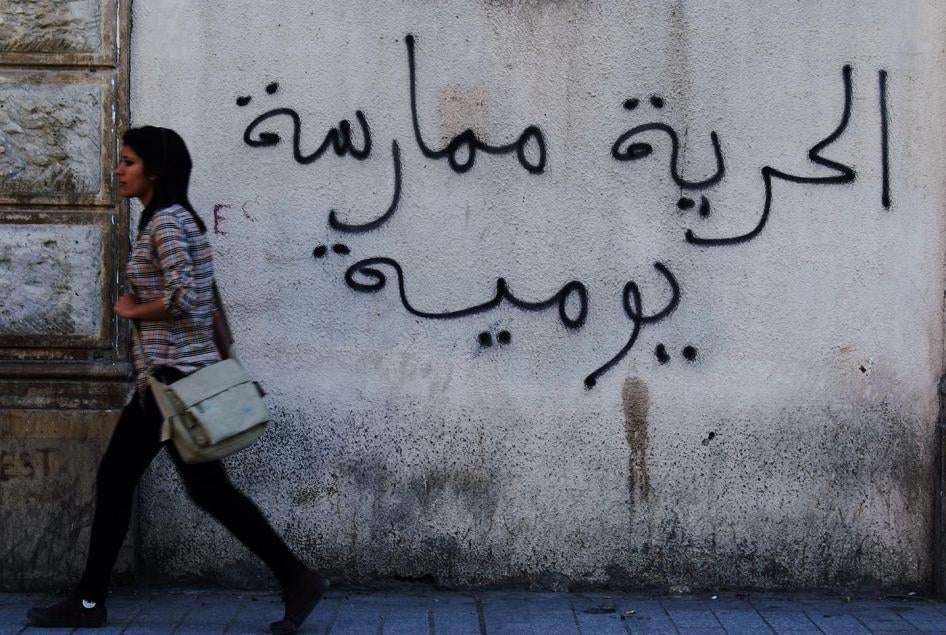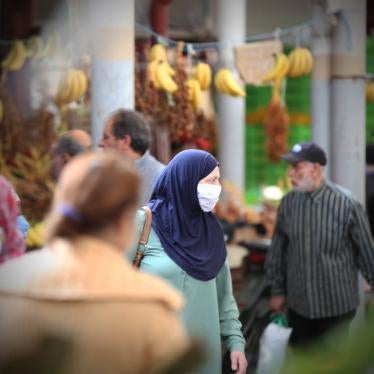(Tunis) – A Tunis court on November 12, 2020 sentenced a blogger, Wajdi Mahouechi, to two years in prison for posting a Facebook video that a court official deemed offensive, Human Rights Watch said today.
Mahouechi, 31, a frequent commentator on issues of public interest, posted a video on November 1 to his Facebook page that denounced a Tunis public prosecutor’s failure to arrest and open an investigation against a Tunisian imam who appeared to justify killing people who insult the Prophet Muhammad. Prosecutors instead charged Mahouechi with “accusing officials of crimes without providing proof,” “offending others via telecommunications networks,” “public calumny,” and “insulting an officer on duty.” The charges stem from the penal code as well as Tunisia’s 2001 telecommunications code.
“Tunisia’s legal codes are rife with vague laws that the authorities use to penalize free speech and silence critical voices,” said Eric Goldstein, acting Middle East and North Africa director at Human Rights Watch. “Tunisia hails itself for promoting free speech since its 2011 revolution, but is regressing on protecting that right.”
The imam’s video followed the October 16, 2020 beheading of Samuel Paty, a public school teacher in France, by a Chechen refugee after Paty displayed caricatures of the Prophet Muhammad in his classroom as part of a lesson on freedom of expression. The video seems to have been removed from Facebook later.
In his November 1 Facebook post, Mahouechi also criticized the prosecutor for not investigating a 2019 complaint that he had filed against police officers who he alleged had beaten him. Mahouechi used language that might be viewed as vulgar, but said he was insulting only this prosecutor and not the entire judicial apparatus.
Officers from the Hay El Khadra Unit for Combatting Terrorism and Organized Crime arrested Mahouechi on November 2 and interrogated him for at least four hours in the presence of his lawyer, Mohamed Ali Bouchiba. The lawyer is the co-founder of Bloggers Without Chains, a group formed by volunteer lawyers to defend social media activists and others prosecuted for Facebook posts.
Bouchiba told Human Rights Watch that police officers had come to the Mahouechi’s family house late at night looking for him. “We knew he would be arrested,” said Bouchiba. “Officers took him just one day after he posted his video.”
Bouchiba said that Mahouechi told his interrogators that he was not targeting anyone in his post and only reacted as a whistleblower to the imam’s video for the sole purpose of denouncing extremist ideas and terrorism.
The Tunis First Instance Court convicted Mahouehchi of “accusing public officials of crimes related to their jobs without furnishing proof,” punishable by up to two years in prison under article 128 of the penal code; “knowingly harming or disturbing others via public telecommunications networks” under article 86 of the telecommunications code, which stipulates a sentence of up to two years in prison and a fine up to 1,000 Tunisian dinars (around US$300); “public calumny” under article 245 of penal code; and “insulting a public officer during the performance of their duties,” punishable by up to one year in prison under article 125 of the penal code.
“We are seeing an increase of prosecutions that remind us of the arrests and trials of bloggers and social media critics in 2017,” Bouchiba said. “The prosecutions never stopped really. They just slowed down and now they’re back.”
Two reports published by Human Rights Watch, in January and October 2019, documented prosecutions of bloggers and social media activists in Tunisia for their peaceful online commentary. In these prosecutions, authorities made use of laws on criminal defamation, “spreading false information,” and “harm of others through telecommunications networks” to prosecute people who post on social media about politics, expose corruption, or criticize top officials.
Since 2017, Tunisian courts have sentenced six social media activists to prison for critical views they posted. The two-year sentence against Mahouechi is the most severe so far against a blogger for online criticism, Bouchiba said. Mahouechi is currently serving his sentence in Tunis’s Mornaguia prison. His lawyers will appeal the verdict.
“Tunisia has no excuse to prosecute peaceful critics and intimidate bloggers who attack state authorities” Goldstein said. “Parliament should move quickly to amend or delete laws that are relics of the ousted autocratic regime.”
|
News Release
Tunisia: Harsh Sentence Against Blogger
Repeal Laws Restraining Free Speech
Correction
The name of Mohamed Ali Bouchiba's group has been updated to "Bloggers Without Chains."
Your tax deductible gift can help stop human rights violations and save lives around the world.
Region / Country
Topic
Most Viewed
-

-
November 25, 2019
A Dirty Investment

-
April 27, 2021
A Threshold Crossed

-
February 20, 2026
Abuses in Cameroon After US Deports Third-Country Nationals

-
January 23, 2018
Hidden Chains





